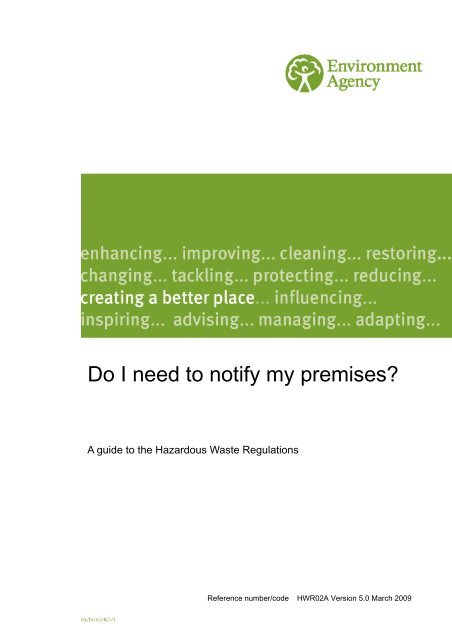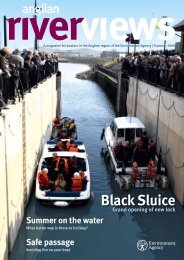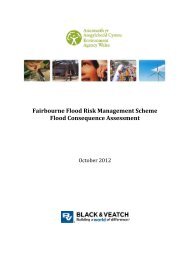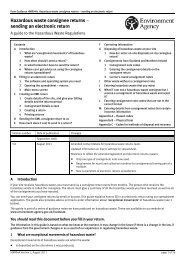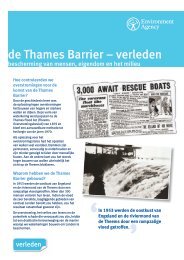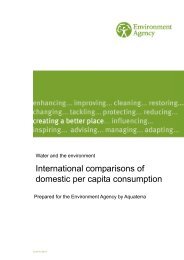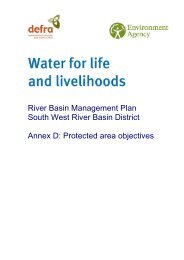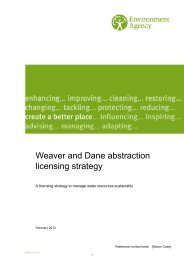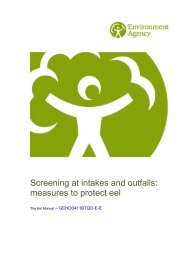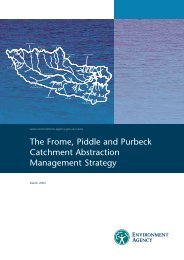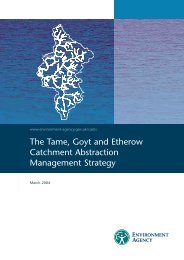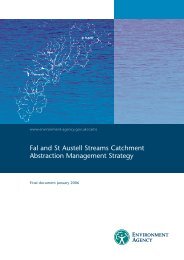Do I need to notify my premises?
Do I need to notify my premises?
Do I need to notify my premises?
Create successful ePaper yourself
Turn your PDF publications into a flip-book with our unique Google optimized e-Paper software.
<strong>Do</strong> I <strong>need</strong> <strong>to</strong> <strong>notify</strong> <strong>my</strong> <strong>premises</strong>?<br />
A guide <strong>to</strong> the Hazardous Waste Regulations<br />
Reference number/code HWR02A Version 5.0 March 2009
We are the Environment Agency. It's our job <strong>to</strong> look after<br />
your environment and make it a better place - for you, and<br />
for future generations.<br />
Your environment is the air you breathe, the water you drink<br />
and the ground you walk on. Working with business,<br />
Government and society as a whole, we are making your<br />
environment cleaner and healthier.<br />
The Environment Agency. Out there, making your<br />
environment a better place.<br />
Published by:<br />
Environment Agency<br />
Rio House<br />
Waterside Drive, Aztec West<br />
Almondsbury, Bris<strong>to</strong>l BS32 4UD<br />
Tel: 0870 8506506<br />
Email: enquiries@environment-agency.gov.uk<br />
www.environment-agency.gov.uk<br />
© Environment Agency<br />
All rights reserved. This document may be reproduced with<br />
prior permission of the Environment Agency.<br />
Environment Agency HWR02A <strong>Do</strong> I <strong>need</strong> <strong>to</strong> <strong>notify</strong> <strong>my</strong> <strong>premises</strong>? 1
Contents<br />
Aims 3<br />
What are <strong>premises</strong>? 4<br />
Are there any exclusions or exemptions from notification? 4<br />
I share <strong>my</strong> site and / or <strong>my</strong> waste s<strong>to</strong>rage area with<br />
others - do I <strong>need</strong> <strong>to</strong> <strong>notify</strong> <strong>my</strong> <strong>premises</strong>?<br />
I’m operating a transfer station - do I <strong>need</strong> <strong>to</strong> <strong>notify</strong> <strong>my</strong><br />
<strong>premises</strong>?<br />
2 Environment Agency HWR02A <strong>Do</strong> I <strong>need</strong> <strong>to</strong> <strong>notify</strong> <strong>my</strong> <strong>premises</strong>?<br />
6<br />
9
Aims<br />
You should read this guide if you want <strong>to</strong> find out if you are required <strong>to</strong> <strong>notify</strong><br />
(register) your <strong>premises</strong> because of the Hazardous Waste Regulations (HWR).<br />
If you are required <strong>to</strong> <strong>notify</strong> your <strong>premises</strong> but do not, you will be breaking the law<br />
if you produce any hazardous waste or have any hazardous waste removed from<br />
your <strong>premises</strong>.<br />
When you <strong>notify</strong> your <strong>premises</strong> in accordance with the HWR, the details are placed<br />
on a register and you will be given a hazardous waste producer registration number<br />
called a ‘<strong>premises</strong> code’.<br />
The whole notification process is often referred <strong>to</strong> as ‘registration’. In this<br />
document the terms <strong>notify</strong> or notification and register or registration are used<br />
interchangeably and mean the same thing.<br />
The term consignment means <strong>to</strong> move hazardous waste from one <strong>premises</strong> <strong>to</strong><br />
another.<br />
This guide only applies <strong>to</strong> hazardous waste producers and holders in England and<br />
Wales. It is part of a series of documents that explain how the HWR work.<br />
This guide explains whether you might be excluded or exempt from notification.<br />
If you are required <strong>to</strong> <strong>notify</strong> your <strong>premises</strong> you should read our guide HWR02B:<br />
“How <strong>to</strong> <strong>notify</strong> your <strong>premises</strong>”.<br />
The information in this guide is based on what we know at the moment. It may<br />
change in the future if there is a change in Law, guidance from the Government<br />
changes or as a result of our experience in regulating hazardous waste.<br />
Environment Agency HWR02A <strong>Do</strong> I <strong>need</strong> <strong>to</strong> <strong>notify</strong> <strong>my</strong> <strong>premises</strong>? 3
What are <strong>premises</strong>?<br />
The HWR define <strong>premises</strong> <strong>to</strong> include land and any ship and any other<br />
means of transport from which a mobile service is operated.<br />
This means that any place or vehicle from which a mobile service is operated can<br />
be <strong>premises</strong> and will <strong>need</strong> <strong>to</strong> register unless excluded or exempt.<br />
Are there any exclusions or exemptions from<br />
notification?<br />
<strong>Do</strong>mestic <strong>premises</strong><br />
The HWR do not apply <strong>to</strong> domestic waste except where that waste is:<br />
• asbes<strong>to</strong>s produced by a contrac<strong>to</strong>r. In this case, the contrac<strong>to</strong>r may have <strong>to</strong><br />
<strong>notify</strong> the place where the waste is collected from (if those <strong>premises</strong> are not<br />
exempt); or<br />
• “separated domestic fractions” (other than asbes<strong>to</strong>s). In this case, the<br />
<strong>premises</strong> it is collected from will not <strong>need</strong> <strong>to</strong> be notified. The place where this<br />
waste is taken <strong>to</strong> must be notified (unless those <strong>premises</strong> are exempt).<br />
Flytipped waste<br />
The HWR state that where waste has been flytipped, it may be removed from<br />
those <strong>premises</strong> without those <strong>premises</strong> being notified. For example, where<br />
waste has been flytipped on land, that waste may be removed without the site<br />
being registered.<br />
Where mobile service opera<strong>to</strong>rs produce all of your hazardous waste<br />
Premises may have all of their waste produced during construction, repair or<br />
maintenance by one or more mobile services. In this case you may not <strong>need</strong> <strong>to</strong><br />
<strong>notify</strong> your <strong>premises</strong>. There are rules about what a mobile service is - you should<br />
check our guide HWR07 Mobile Services <strong>to</strong> find out more. You can find this<br />
document on the “Register or renew as a hazardous waste producer” link:<br />
www.environment-agency.gov.uk/hazwaste<br />
Any <strong>premises</strong> identified in a Regula<strong>to</strong>ry Position Statement of <strong>premises</strong><br />
notification<br />
We may decide that in particular circumstances there is no requirement <strong>to</strong> <strong>notify</strong><br />
<strong>premises</strong>. You can find details of these regula<strong>to</strong>ry position statements on our<br />
website: www.environment-agency.gov.uk/hazwaste<br />
4<br />
Environment Agency HWR02A <strong>Do</strong> I <strong>need</strong> <strong>to</strong> <strong>notify</strong> <strong>my</strong> <strong>premises</strong>?
Other exemptions<br />
If a <strong>premises</strong> can comply with conditions 1 and 2 below then it will be exempt.<br />
Condition 1: <strong>Do</strong>es a registered carrier or an exempt carrier collect all the<br />
hazardous waste?<br />
The HWR state that all hazardous waste must be collected by either a registered<br />
carrier or exempt carrier. If not, the <strong>premises</strong> must be notified. There are other<br />
environmental regulations that require anyone who carries waste must be<br />
registered with the Environment Agency before they can do so. (This is a different<br />
sort of registration <strong>to</strong> <strong>notify</strong>ing <strong>premises</strong>).<br />
Exempt carriers include:<br />
• a waste collection authority, waste disposal authority or waste regulation<br />
authority;<br />
• the waste producer carrying their own waste, except where it is building or<br />
demolition waste;<br />
• a charity or voluntary organisation.<br />
If you use an unregistered carrier or one who is not exempt from registration<br />
<strong>to</strong> move your waste, you will be breaking the law (and so will the carrier).<br />
Condition 2: How much hazardous waste do you produce in any 12 month<br />
period?<br />
The HWR state that <strong>premises</strong> may only be exempt if the “qualifying<br />
limitation is observed”. This limit is 500kg of hazardous waste in any 12 month<br />
period”. If you plan <strong>to</strong>, or actually do produce, collect or remove 500 kg or more<br />
you will <strong>need</strong> <strong>to</strong> <strong>notify</strong> those <strong>premises</strong>.<br />
Where hazardous waste is removed from a ship, the ship does not <strong>need</strong> <strong>to</strong> be<br />
registered. There is no limit on the amount of hazardous waste that can be<br />
produced on, or removed from, a ship.<br />
Note: Waste that is collected from your <strong>premises</strong> using a mobile service provider<br />
does not count <strong>to</strong>wards the 500 kg limit for the wastes at your <strong>premises</strong>. However<br />
these collections must comply with the requirements set out in our guidance<br />
document HWR07 Mobile Services.<br />
There is no requirement for an exempt hazardous waste producer <strong>to</strong> inform<br />
the Environment Agency. It is a hazardous waste producer’s responsibility <strong>to</strong><br />
show that he is properly exempt. We do not maintain a list of these<br />
exemptions so you should not contact us <strong>to</strong> check this.<br />
Even if a producer does not <strong>need</strong> <strong>to</strong> <strong>notify</strong> their <strong>premises</strong>, they still <strong>need</strong> <strong>to</strong><br />
follow other parts of the HWR. This includes any requirement <strong>to</strong> use<br />
consignment notes. For example an office, removing up <strong>to</strong> 500 kg hazardous<br />
waste, must prepare hazardous waste consignment notes in the normal way<br />
even if the <strong>premises</strong> do not <strong>need</strong> <strong>to</strong> be registered.<br />
Environment Agency HWR02A <strong>Do</strong> I <strong>need</strong> <strong>to</strong> <strong>notify</strong> <strong>my</strong> <strong>premises</strong>?<br />
5
I share <strong>my</strong> site and / or <strong>my</strong> waste s<strong>to</strong>rage area<br />
with others - do I <strong>need</strong> <strong>to</strong> <strong>notify</strong> <strong>my</strong> <strong>premises</strong>?<br />
Defra, the Government department responsible for the environment, has said:<br />
“Where organisations have multiple <strong>premises</strong>, each <strong>premises</strong> will <strong>need</strong> <strong>to</strong> be<br />
notified <strong>to</strong> the Environment Agency, unless exempt, although a central office may<br />
do this on behalf of the individual <strong>premises</strong> if they wish. If single <strong>premises</strong> are<br />
occupied by a number of different organisations producing hazardous waste, the<br />
part of the <strong>premises</strong> occupied by each organisation should be individually notified.”<br />
Example A Where a site consists of several buildings all within the control of<br />
the same opera<strong>to</strong>r / business unit the buildings taken <strong>to</strong>gether will generally<br />
constitute a single <strong>premises</strong>. It will be a question of fact whether two buildings<br />
occupied by the same person will be on the same site and can properly be<br />
regarded as the same <strong>premises</strong>. If there is no obvious common boundary around<br />
the two buildings it will be unlikely that the they are the same <strong>premises</strong> and more<br />
likely that each will have <strong>to</strong> be notified separately. Where there would be a single<br />
boundary for a site, but for a public or other highway dividing that site, the<br />
Environment Agency will treat the separate parts of the site on each side of the<br />
highway as comprising the same <strong>premises</strong>.<br />
Similarly, in a <strong>to</strong>wer block two adjacent floors occupied by the same producer<br />
may constitute the same <strong>premises</strong>. However, if two floors are separated by a floor<br />
occupied by a different producer, then they cannot be treated as single <strong>premises</strong><br />
and will have <strong>to</strong> be notified separately.<br />
Example B Where there are several discrete units within a site, such as retail<br />
units within a shopping centre, each of those units will be separate <strong>premises</strong> and<br />
<strong>need</strong> <strong>to</strong> be notified separately. This would apply even if the shopping centre<br />
arranges for general waste collection <strong>to</strong> be taken <strong>to</strong> a separate central collection<br />
point within the centre. That separate collection point would also <strong>need</strong> <strong>to</strong> be<br />
notified as <strong>premises</strong>. We would not expect there <strong>to</strong> be consignment from the retail<br />
<strong>premises</strong> <strong>to</strong> the collection point, but we would expect consignment from the<br />
collection point. We would expect that the opera<strong>to</strong>r of the collection point <strong>to</strong> have a<br />
system in place that enables them <strong>to</strong> properly complete (including full description<br />
of the waste, identification of the producer of the waste, and the hazardous<br />
properties) the consignment note when the waste is removed from the collection<br />
point.<br />
6<br />
Environment Agency HWR02A <strong>Do</strong> I <strong>need</strong> <strong>to</strong> <strong>notify</strong> <strong>my</strong> <strong>premises</strong>?
Scenario 1<br />
Retail unit operated by B<br />
Retail unit<br />
operated by A Collection point<br />
operated by X<br />
Retail unit<br />
operated by C<br />
Each of the retail units operated by A, B and C would have <strong>to</strong> be notified<br />
separately and the collection point operated by X would also have <strong>to</strong> be separately<br />
notified.<br />
Scenario 2<br />
Retail unit operated by B<br />
Retail unit<br />
operated by A Collection point<br />
operated by X<br />
Retail unit<br />
operated by X<br />
The retail units operated by A and B would have <strong>to</strong> be notified separately and X<br />
would have <strong>to</strong> <strong>notify</strong> both the retail <strong>premises</strong> and the collection point as separate<br />
<strong>premises</strong>.<br />
Environment Agency HWR02A <strong>Do</strong> I <strong>need</strong> <strong>to</strong> <strong>notify</strong> <strong>my</strong> <strong>premises</strong>?<br />
7
Scenario 3<br />
8<br />
Retail unit<br />
operated by A<br />
Retail unit operated by B<br />
Retail unit<br />
operated by X<br />
Collection area<br />
within retail unit<br />
The retail units operated by A and B would have <strong>to</strong> be notified separately and X<br />
would have <strong>to</strong> <strong>notify</strong> the retail <strong>premises</strong> / collection point in a single notification.<br />
Example C The same principles concerning notification of <strong>premises</strong> set out in<br />
Example B can be applied <strong>to</strong> hospital sites occupied by multiple<br />
organisations. If there is a discrete unit operated by a producer of hazardous<br />
waste that unit is likely <strong>to</strong> be separate <strong>premises</strong> and should be notified.<br />
Example D Where there is an open yard and several opera<strong>to</strong>rs each have<br />
responsibility for and use of a clearly defined part of that yard each part should be<br />
notified. Where there is no clear distinction the entire <strong>premises</strong> should be notified.<br />
The <strong>to</strong>tal amount of hazardous waste produced by all the producers at the site<br />
should be taken in<strong>to</strong> account in deciding whether the <strong>premises</strong> are exempt or not.<br />
If there is any doubt whether the <strong>premises</strong> are exempt or not, it is open <strong>to</strong> any of<br />
the opera<strong>to</strong>rs of the yard <strong>to</strong> <strong>notify</strong> the <strong>premises</strong>. If the <strong>premises</strong> are not notified<br />
and the exemption limit is exceeded, all the producers maybe liable <strong>to</strong> enforcement<br />
action.<br />
Example E A contaminated land site where more than one producer may be<br />
operating at any one time (unless there is a genuinely discrete area operated as<br />
separate <strong>premises</strong> from the contaminated land site) can be treated as single<br />
<strong>premises</strong> and notified once. The obligation for the notification should generally be<br />
arranged by the main contrac<strong>to</strong>r for the site. We would not expect each subcontrac<strong>to</strong>r<br />
<strong>to</strong> <strong>notify</strong> the <strong>premises</strong> separately.<br />
Environment Agency HWR02A <strong>Do</strong> I <strong>need</strong> <strong>to</strong> <strong>notify</strong> <strong>my</strong> <strong>premises</strong>?
I’m operating a transfer station. <strong>Do</strong> I <strong>need</strong> <strong>to</strong><br />
<strong>notify</strong> <strong>my</strong> <strong>premises</strong>?<br />
Yes. Waste transfer stations or collection points will be required <strong>to</strong> <strong>notify</strong> because they<br />
are <strong>premises</strong> which hold hazardous waste. Notification is not only <strong>to</strong> do with production<br />
of waste.<br />
Environment Agency HWR02A <strong>Do</strong> I <strong>need</strong> <strong>to</strong> <strong>notify</strong> <strong>my</strong> <strong>premises</strong>?<br />
9
Would you like <strong>to</strong> find out more about us,<br />
or about your environment?<br />
Then call us on<br />
08708 506 506 (Mon-Fri 8-6)<br />
email<br />
enquiries@environment-agency.gov.uk<br />
or visit our website<br />
www.environment-agency.gov.uk<br />
incident hotline 0800 80 70 60 (24hrs)<br />
floodline 0845 988 1188<br />
Environment first: This publication is printed on paper made from<br />
100 per cent previously used waste. By-products from making the pulp<br />
and paper are used for composting and fertiliser, for making cement and for<br />
generating energy.<br />
10<br />
Environment Agency HWR02A <strong>Do</strong> I <strong>need</strong> <strong>to</strong> <strong>notify</strong> <strong>my</strong> <strong>premises</strong>?


